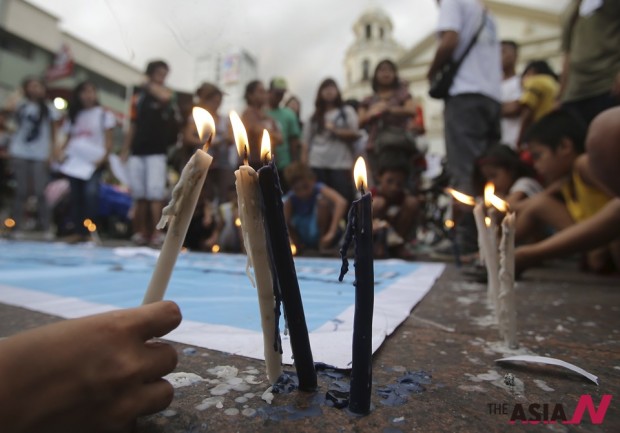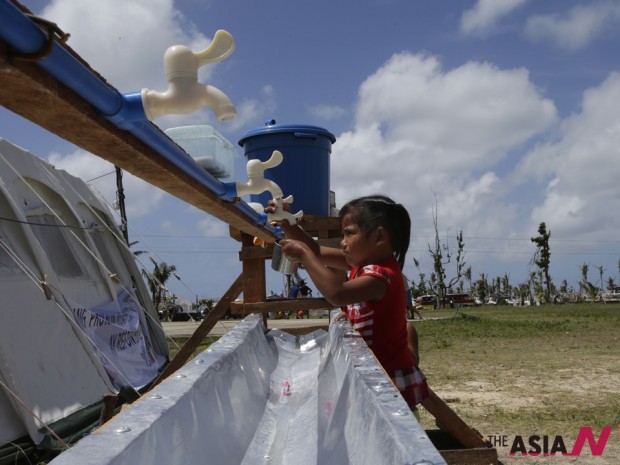Leyte rising- from the shoulders of women

Lighting candles in downtown Manila, May 8, 2014 for the rehabilitation of typhoon-damaged central Philippines (Photo : AP/NEWSis)
The impact of super-typhoon Haiyan that hit central Philippines last November 2013 was tremendous. More than 10,000 lives were lost, and half a million Filipinos lost their homes, livelihoods and farms. More than 1.1 million students were affected, as their schools were washed out or ravaged by the winds and waves. Farmers lost almost 80 per cent of coconut trees and about 90 per cent of the fishers’ boats and fishing gear was destroyed.
Women and children carry a huge burden in the aftermath of Typhoon Haiyan. Women are expected to be mothers and wives and have multiple burdens – getting water, preparing food, securing the house, earning a living and taking care of the children. The children, on the other hand, will not be enjoying their summer vacation. There will be no swimming at the beach, no picnics in the hills, no joy-trips to the malls in Tacloban City or Ormoc City to see a movie, browse the bookstore or laugh out loud while eating fast food. Even the ice cream man might not visit this summer. His ice cream cart would have been destroyed or there is not enough milk or fruits to produce ice cream. For both the mother and the child, the coming start of the school year this June is their main problem. Where will they get money to buy uniforms, school supplies or books?
Amidst all the loss and wreckage, the women from the town of MacArthur in Leyte Province are showing the way towards rebirth and recovery. They have decided that they can either wait around in frustration or stand up and do something with what they have. The plan was simple – clean the land, plant vegetables and start an organic farm. Their idea was if everyone kept busy, there would be no time to think about their problems. There would only be time to work, to meet, to work, to plan, and then work again. Quite simple. But very empowering and effective in mobilizing the community towards action and solving their problems, which included inadequate food supply, debris and fallen trees in the farmlands, lack of livelihood and income, and the diminishing spirit of the community.
In February, an organization called UNLAD (Unahin Natin Lagi Ang Diyos or literally, Always Put God First) put their plan to work. The term “unlad” means “to grow” or “development.” They are a group of fishers and coconut farmers, and most of their leaders and active members are women. Bernardita Murcilla, 66 years old, and lovingly called “Auntie Brennie” by everyone, is the treasurer, and she posed a challenge to the more than 110 members of UNLAD. She said she was willing to lend her land of about two hectares for one year without any rent, if the members would clean, work and make it productive. Her challenge was received. Within two weeks, more than 60 people volunteered their time and skills to clean the area, cut lumber and put a fence around the planned farm. Auntie Brennie asked for help from the state university to give them seeds and send a farm technician. She also asked a national group of farmers to help them plan their farm, since they were only familiar with coconuts and had no idea about fruits or vegetable farming. The women also suggested planting root crops (taro, sweet potatoes and yam), since these can withstand both the hot summer and the wet rainy season, ensuring that they have food. By the first week of May, a regular rotation of five women was already harvesting every day between 10-15 kilos of cucumbers, monggo beans, bitter gourds, sweet potatoes and string beans. The tomatoes and corn are to be harvested by June or July.

Children typhoon survivors wash their hands outside their tent. There are signs of progress since the monster storm slammed into the Philippines on Nov. 8, 2013. (Photo : AP/NEWSis)
Mobilizing community toward action
Coconut seedlings are being raised in a nursery provided by an international humanitarian organization. The farm plan also includes the construction of a potable water system so that the women will not have to walk for to get drinking water. They will also have an organic fertilizer production, a poultry section, and a small training center to receive visitors and train other women.
It has been half a year since Haiyan hit the country with its ferocity. But nothing will keep the women of MacArthur down. “Bawal ang tamad dito sa amin!” (Laziness is not allowed here!) exclaimed Tita Brenie. With this spirit of hope and entrepreneurship of these women, the rebirth and recovery of Leyte is made more easy and realistic.
























































